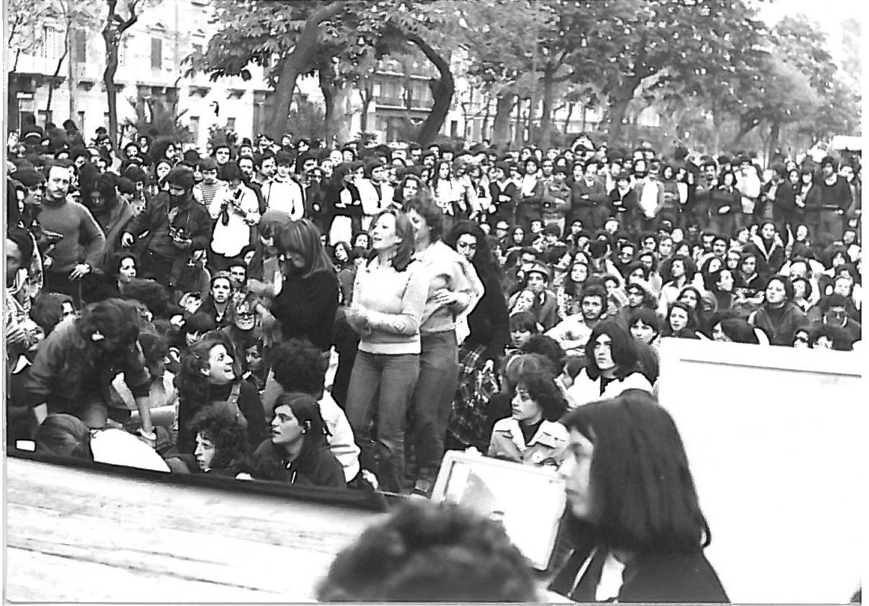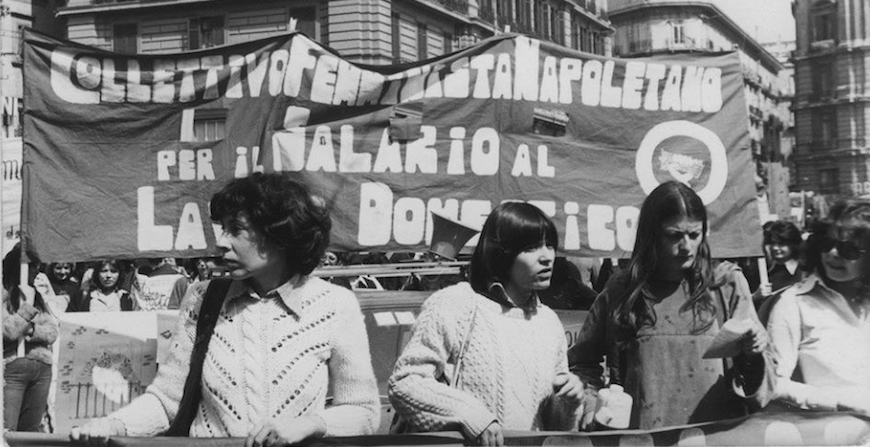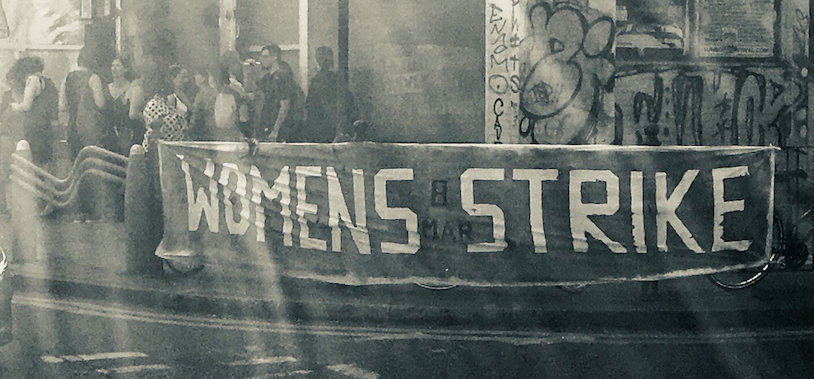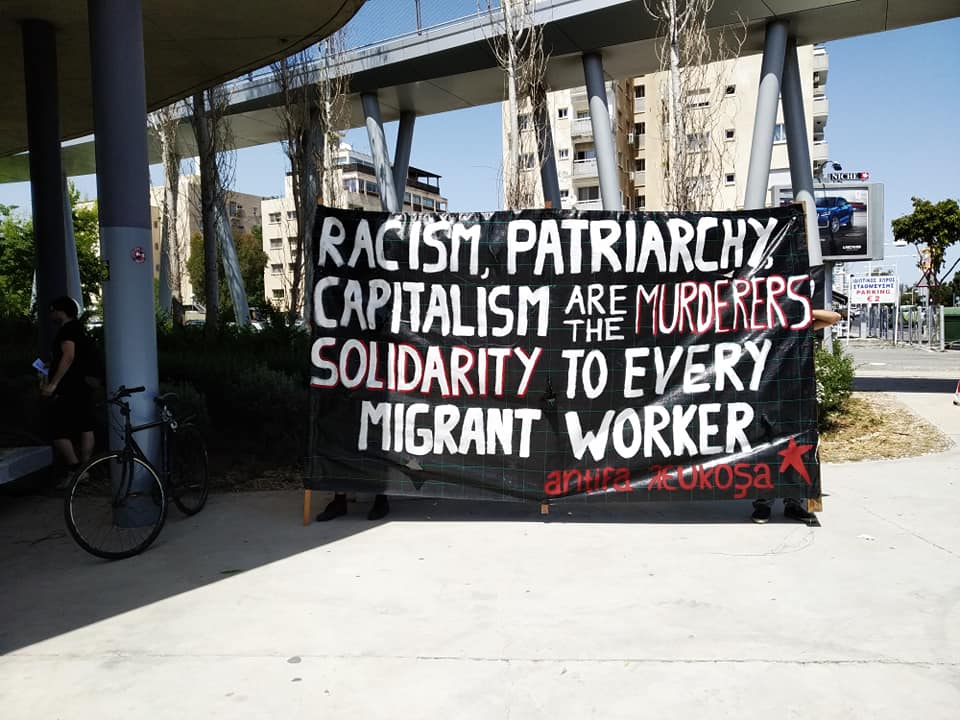By Camille Barbagallo, a Plan C member
We are pleased to republish here the Introduction to Women and the Subversion of the Community: A Mariarosa Dalla Costa Reader (2019) just published by PM Press. Mariarosa Dalla Costa’s seminal work, which since the early 1970s brought together the collective theoretical and political experiences of operaismo and feminism, is at the origins of social reproduction theory and of great relevance for our politics today.

The present conditions of womanhood keep pushing us toward the past. From the overrepresentation of women in low paid and low-status jobs and the structural and interpersonal violence that women face to the continued attacks on women’s sovereignty over their bodies and the fact that women still do the vast amount of unwaged childcare, elder care, and housework: the insights from 1970s feminism keep reappearing. One of the reasons that 1970s feminism continues to be relevant is because when we analyze the contemporary conditions of life and labor for the vast majority of women, what currently passes for mainstream feminism not only misses the point, it reads more like a slap in the face. This is not least because when we consider that women are overrepresented in welfare lines, in the growing numbers of the working poor, the dispossessed, and the highly exploited, there is something violent in the distance between the conditions of life and labor for the majority of women and the concerns that currently constitute mainstream feminism.
Mainstream feminism today—much of it corporate sponsored, coated in pink, incorporated into forms of repressive legislation, and providing justification for military operations—is more interested in ‘saving’ and ‘rescuing’ vulnerable women than in dismantling the economic and political systems that produce our vulnerability and exploitation. The emergence and popularity of a corporate feminism that calls for women to ‘lean in’ to get ahead in the workplace conveniently locates the problem at the level of women’s individual lack of aspiration and ambition. As a number of feminist scholars have pointed out, one of the problems is that so much of mainstream gender politics sings from the same song sheet as neoliberalism. “The future is female,” we are told, with an emphasis on the individual female self, who is always making ‘choices’ and possessing that much needed entrepreneurial spirit. Women’s individual capacity to adapt and succeed in historically male dominated arenas of power is a barometer of this new entrepreneurialism—with the usual outcome being women exploiting other women. We are told we just need to feminize capitalism and things will get better—so much so that a systematic and structural analysis of how gender operates in and through capitalism has been abandoned in favor of feminist celebrities and being the next female Bill Gates in the making. There is a constant celebration of individual women’s success stories in their start-up businesses, sporting events, or parliament, with that obligatory paragraph about how she amazingly manages to balance it all with marriage and motherhood.
There is a political fatigue that haunts the ideas and campaigns animating mainstream feminism: breaking through glass ceilings, ending male violence, tackling gender pay gaps, getting more women into parliament, and the so-called ‘mummy wars.’ When we talk about gender and what it means to be a woman today, the conversation never seems to get around to issues such as the lack of affordable and safe housing, immigration raids, cuts to legal aid, hospital closures, the privatization of elder care—all of which negatively affect women. But, let’s be clear: they disproportionately affect working-class women.
Contemporary mainstream feminist politics is trapped in a loop—or, perhaps more correctly, can be said to have reached an impasse. It is not just that feminism today appears hopelessly out of touch and is too often racist and transphobic. It’s more than that: it’s that mainstream feminism is actually part of the problem. To be blunt, focusing on getting more and more women into the waged workforce as the primary way to address questions of gender inequality has certainly benefitted a few women at the top, but it has been disastrous for the rest of us—especially migrants, women of color, and those of us too poor to pay another woman to do the reproductive work that we don’t like doing or don’t have time to do. In global cities across the world, a growing army of working-class women, many of them migrants and women of color, work to clean homes and offices, cook and prepare food, staff hospitals and schools, and take care of elders and children. They are the women who perform ever more of the reproductive labor that is fundamental for the maintenance of life, but their labor continues to be devalued, degraded, and considered low skilled. They do this labor for ridiculously low wages and in exploitative conditions, denied basic work rights like holiday pay, maternity leave, pensions, and dignity at work.
The globalized context of women’s exploitation is such that the current conditions of womanhood are marked by an ever increasing polarization of the experiences, opportunities, and struggles that different communities and households face. Whether the difference lies in how our children are policed when they are on the streets, whether we walk into work as a cleaner or manager, or whether we worry about how to get our kids across the border in a boat or how to take them on a holiday during school term, these differences make it clear that how we experience womanhood is produced as much by race and class as it is by relations of gender. The continued inability—and let’s be clear that at times it’s an unwillingness—to understand the ways that race and class produce gender and the reverse, how gender produces and intersects with race and class, has meant that mainstream feminism ends up talking about and to a very particular group of women: overwhelmingly white, middle-class women who live in global cities in developed countries.
The destruction of decent wages and employment conditions over the last forty years has meant that all adults are now expected and compelled to be ‘active’ in the labor market. The normalization of the ‘adult worker model’ has occurred at the same time as the nation-state has consistently withdrawn support and funding for social services that make the conditions for a decent life and women’s labor market participation bearable. When you add into the mix that the gendered organization of domestic and care work in most households has remained pretty much the same as it was in the 1970s, it becomes clear why there has been a renewed and sustained interest not only in 1970s feminism, but specifically in the political tendency of Marxist feminism and the contributions of Mariarosa Dalla Costa. For the vast majority of us who will never have the opportunity or the desire to be a female CEO, the problem with mainstream feminism is that it obscures the class and race antagonisms that are central to how gender is organized and experienced under capitalism. If women’s struggles for empowerment and equality continue to be built on the backbreaking and devalued reproductive labor of other women, feminism will remain part of the problem. The reason Marxist feminism, of which Mariarosa’s work is emblematic, is useful is that it gives us a mobile compositional lens that acknowledges the bifurcated experiences of class, race, and gender as they intersect and provides a radical orientation for a life beyond capitalism.
***

I can say without hyperbole that the political and intellectual work of Mariarosa Dalla Costa changed my life. Her intellectual contribution, spanning five decades, has danced both center stage and in the shadows of my personal and intellectual life for nearly twenty years. I spent seven years writing a doctoral thesis that analyzed her work in nearly every chapter. I survived a crisis of motherhood by eventually wrapping my head around the contradictions that occur when you produce the capitalist commodity of labor power and, at the same time, life. As a result, I spend time thinking about the complexity of housework under capitalism while picking up toys or scrubbing the bathroom, transforming the tasks into a worker’s enquiry rather than only a burden to be escaped.
This edited volume brings together a collection of Mariarosa’s essays that focus on the politics of reproduction, feminist movements, and the question of women’s autonomy. After I agreed to edit this volume, and during the long hours of agonizing over writing this introduction, it became clear that what should be a relatively straightforward task of situating her contribution within both the traditions of Italian operaismo and women’s liberation movements was, in fact, going to be anything but simple. In part it is a complicated task because there is something nearly impossible to grasp in Mariarosa’s work. She pushes us toward thinking and analyzing the conditions of women in a way that feels like things might just break if we follow her thoughts to their conclusion. In sharp contrast to the mainstreaming of neoliberal gender politics, the ungovernability and radical potential of her ideas lie in the injunction not just that things could break but that they should. When I think about what her work does, its effect often feels like a dusty heavy curtain being pulled back. What I mean by that is that her work helps us to make visible many of the key dynamics and contradictions inherent to capitalism and to make sense of the notion that there is nothing ‘natural’ about the way we reproduce life and labor under capitalism.
At a meeting in Padova in 1972, Mariarosa Dalla Costa, Selma James (London), Silvia Federici (New York), and Brigitte Galtier (Paris) formed the International Feminist Collective to develop a militant feminist politics and to promote debate on reproductive work, the woman as its subject, and the family as a place of production and reproduction of labor power. Through the coordination of self-organized women’s collectives and actions in various countries, a vast international network formed: Wages for Housework groups and committees.
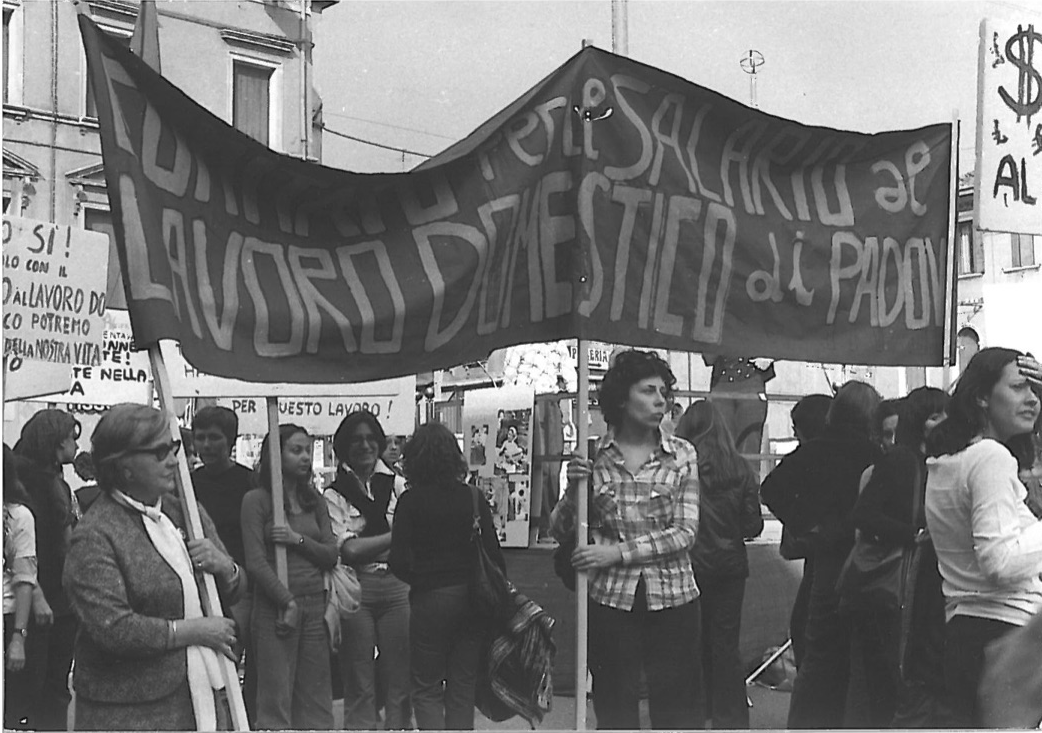
Their political work played a leading role in the development of a political tendency within 1970s feminism that promoted and organized major struggles with an anti-capitalist perspective. Central to the political work of the Wages for Housework campaign was the demand for a transformation in the organization of production and a society that would produce the conditions for women to gain personal autonomy, starting with women’s economic autonomy. However, their politics broke with previous feminist theories and with the dominant ideas of women’s emancipation at the time. Women’s autonomy, they argued, would never be realized through women taking on additional jobs outside the home. Instead, they demanded recognition of the economic value of reproductive work, encapsulated in the demand for wages for housework. In addition, they demanded that the working week be reduced to twenty hours—so that all people, including men, could have the time to undertake the burdens of reproductive labor, have the space for emotional exchanges, and equally experience the pleasures of reproducing life and being together.
It was a totally self-organized feminism, its activity funded through dues collected from activists. In this sense it had considerable autonomy and power and did not depend on anyone nor was it constrained by the bureaucratic commitments of funded projects like those that would come to dominate feminism in the 1980s and 1990s. Theirs was a feminism that distrusted institutions, keeping a distance from them, even if many of their victories would determine major changes at institutional levels: the legalization of abortion, legal reforms concerning divorce, the establishment of family planning clinics, and new developments in family law. Equally, this was a feminism that was not at all enthusiastic about the politics of women’s equality. They were critical of a politics that viewed women’s liberation as equality with men, who themselves were exploited through the wage relation. Why would women want to be equal to a wage slave? They made the crucial point that any notion of women’s equality remained empty talk if the contradictions and problems of how reproduction is organized under capitalism remained unresolved.
Mariarosa had a prominent role in this militant anti-capitalist feminism. The texts collected in this volume trace developments in her thinking that begin with insights she gained during years of militancy in Potere Operaio (Workers’ Power) in Italy. Through her involvement in the workers’ and students’ struggles of the late 1960s and early 1970s she located silences and gaps in the political action and thought of the time. From these experiences it became clear to her that the discomfort, abuse, and suffering of women, which had not yet started to be articulated through the feminist movement, were absent in political discourse. These silences and gaps became the new terrain for her reflections during a time when the beginnings of a women’s movement were emerging in Italy.
These developments in her political education and activity occurred alongside her academic career. In July 1967, she graduated from the University of Padua with a degree in law, having completed a thesis in philosophy of law under Professor Enrico Opocher. Soon after, Opocher appointed her to archive all the documents relating to the Italian resistance during World War II, which were stored at the Institute of History of the Resistance at the University of Padua, and during the 1970s Mariarosa held various temporary teaching positions at the university. It was during this time that she began to work with Antonio Negri, a former assistant to Opocher, who was on his way to becoming a professor of state doctrine at the Faculty of Political Science. Mariarosa’s encounter with Negri entailed her discovery of the works of Marx, especially The Class Struggles in France from 1848 to 1850 and Capital. It also entailed her discovery of factory militancy, which later became the basis of her political work in Porto Marghera. A she recounts in an interview in 2005 in Derive Approdi, “This was the experience I had been looking for and which responded to my need to understand and to act . . . method, determination, and passion in wanting to take action to transform the existing situation. These were only three basic elements of that experience, but I found them all in the other territories that I crossed over to in the following periods.”
The late 1960s and early 1970s had a deep and longstanding impact on Mariarosa as well as her generation as a whole. The students discovered the workers, the workers discovered the students, and a circuit of intellectuals became involved in these encounters. In short, sites of power were discovered, especially in the university and the factory, but also their mutual relation to a mobile global capital. The experiences of those years were fundamental to Mariarosa’s political training and would guide what she considered to be of importance in her activity in the feminist movement.
Mariarosa’s intellectual work and political activity in the 1970s and 1980s was centered upon the concepts of time and money. She undertook many research projects and engaged in militant study, particularly on the relationship between women and welfare, as well as investigating the connections between women and emigration / immigration, the activity of the women’s movement, and labor and social policies. Some of her most important research is her systematic study, published in 1983, of the 1930s in the United States, in which she analyzes the relationship between the emergence of the welfare system and the redefinition of women’s role in the urban nuclear family. Her interest in this period was motivated by the fact that (albeit with some significant differences, such as the lack of a public health care system) the 1930s in the United States provides the model of reproduction for the modern family in times of crisis.
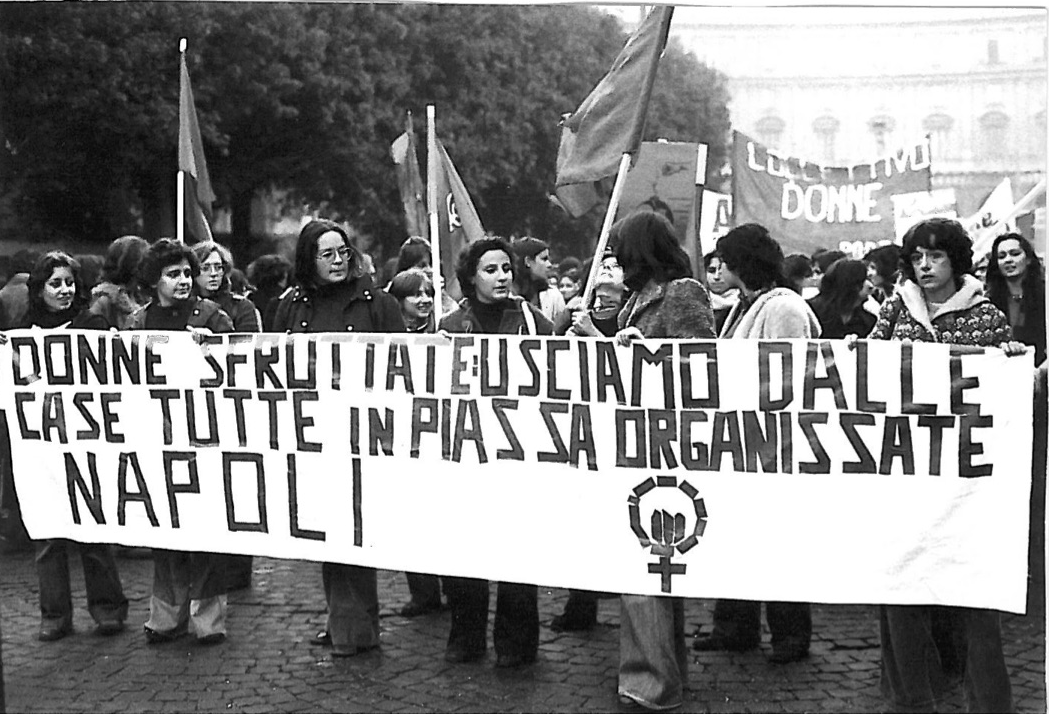
In the 1970s, she travelled to the United States and Canada on several occasions to deliver lectures at universities and meet with feminist activists. During this time, she turned down a teaching position in New York, at Richmond College, Staten Island, deciding she could not stop the political work she had begun with women’s groups in Europe. By the late 1970s, political repression in Italy had effectively silenced the radical political movements of the previous decade. This was certainly true in the case of the radical feminist movement. Demands for wages for housework were either totally ignored or strongly opposed. More broadly, since the 1980s, institutional responses to radical feminist movements have centered upon limiting the scope of gender politics to demands for equal opportunity and anti-discrimination policies. This new dominant ‘post-feminist’ politics was anathema to the convictions of Wages for Housework activists, who distanced themselves from it definitively. They continued their more radical political enquiry and activity by turning their sights to the analysis of capitalist accumulation and the status of women in the Global South. Indeed, on several occasions, Mariarosa travelled along with others to various countries in the Global South to meet with activists and learn from their struggles. In stark contrast to the turmoil and scope of political activity of the previous period in the Global North, any chance of pursuing radical politics that aimed at making great changes appeared to be over by the 1980s
From the early 1990s onward, Mariarosa’s analysis of the sustained and ongoing attacks on the commons brought another issue to the fore in her research: land and the connected issue of food sovereignty. In her more recent works she has paid considerable attention to the struggles of indigenous people and communities around land, water, and the maintenance of subsistence economies and biodiversity. In the winter of 1992–1993, she travelled to Chiapas, Mexico, where she could already see in the various posters praising the heroes of the epic Zapatista guerrillas warnings and the radical potential of a movement that would explode the following year, on January 1, 1994. One such indication was that as early as 1993 the Maya women had already drafted their Women’s Revolutionary Law.
In 1994, Mariarosa was invited to Japan to host a series of conferences on the theme of women and ecology. In Hiroshima she met atomic bomb victims; in Okinawa she met women’s groups that were active in the struggle against the exploitation of sex workers around military bases, and who campaigned for compensation for Korean women who had been abducted and forced to provide sex services for Japanese soldiers during the war. Her tour of major Japanese cities provided the opportunity for a fruitful meeting with several European ecofeminist scholars. With these women, including Maria Mies (Germany) and Vandana Shiva (India), Mariarosa spoke at the Women’s Day on Food in Rome, a conference that ran parallel to the UN Food and Agriculture Organization’s 1996 summit meeting, where Via Campesina[1] launched its program for food sovereignty.
More and more, land (conceptualized within a versatility of meanings) and food policy have become central to Mariarosa’s reflections on how social reproduction is organized and structured at a global level. As she points out in various writings, we need to grasp the strategic nature of current global food policies: it is via these policies that a new formula of domination over humanity is being enacted in which capital is able to continuously diminish freedom and self-sufficiency. In contrast to this and to a life that is increasingly a product of the laboratory is the fight to safeguard the sources and cycles of the spontaneous reproduction of life—the first of which are land, water, and seeds. We need to pay urgent attention to the ways that food is produced, starting with the knowledge that food is not just any old commodity. In this way Mariarosa’s thinking connects to contemporary political tendencies that call for a universal basic income. She argues that the guarantee of human reproduction cannot reside only in the guarantee of money, even in the form of a guaranteed income. What are we to do with the money if we can only buy poison? It is not a question of just having enough hard currency to buy food on the global market, as argued by those who campaign for ‘food security’: we should, as Mariarosa argues, exercise food sovereignty as a right to decide what to eat and how to produce it.
The essays collected in this volume also discuss another often neglected issue that Mariarosa has been researching since the 1990s, one that she calls the third great battle that the female body has to face in its maturity, after those of childbirth and abortion: the abuse of hysterectomy. This procedure often means the unjustified castration of the reproductive powers of the ‘female body,’ just as often happens in the case of the earth. Mariarosa has publicly denounced this abuse in a series of debates with different participants, including doctors and lawyers, which she organized in various Italian cities. With a dedication and force of will that has characterized her political organizing since the late 1960s, she has sought to raise consciousness among women and the medical profession, bringing about considerable positive change on this issue.
In bringing together these essays, we return to the archives of Marxist feminism and to the moments of struggle and the stories of women’s resistance that are too often erased from history lessons. Our return to the past is not only to understand the present but to address the urgent need to find ways to disrupt the continued brutalizing and devastating effects of capitalism. Unlike the forces of reaction, our past is not wrapped up with soft sentimentalities, nor are we nostalgic for a postwar era that never existed. Instead, we return to a defiant and rebellious past, one in which, thankfully, women behaved badly. It is a past in which moments of considerable rupture occurred at the level not only of the political but also of the personal. Women’s movements across the world took aim at everything from the nuclear family and idealized motherhood to women’s limited employment opportunities and the normalization of sexual violence. Of the vast literature of critique and complaint that women produced in the 1970s, one of the threads historically—one that continues today—that binds women’s political and personal lives together is reproductive work: the untold hours of unwaged cleaning, care, sex, and domestic work that produces and reproduces both the possibility of life and the current and future workforce.
Mariarosa’s insistence on understanding the tasks, activities, and processes of reproduction as a labor process has been at the heart of considerable feminist debate and continues to animate much of the feminist theory that seeks to understand the role of domesticity and motherhood. The centrality of women’s domestic destiny to feminist concerns in the 1970s cannot be overstated. From the women’s movement we have inherited a theoretical and political definition of domestic labor. “Women and the Subversion of the Community,” written by Mariarosa in 1971, is widely acknowledged as being the spark that initiated the ‘domestic labor debate’ by redefining housework as work that, while necessary to the functioning of capital, is rendered invisible by its removal from the wage relation. Insofar as the text was influential and provocative at the time of publication, its publication date in the early 1970s intersects with two important historical developments; the emergence of an international women’s movement in the years immediately prior to the elections of Margaret Thatcher and Ronald Reagan, and their ascendancy to power in Britain and the United States, which saw the birth of what is now called neoliberalism.
By returning to the politics of reproduction and women’s struggles for autonomy over our bodies and lives, another line of inquiry is opened: one that necessitates digging around in older conflicts and histories of capitalism and the wage labor system and tracing the interconnections between waged and unwaged labor in societies dominated by the logics of capitalist social relations. In doing so, it is useful to consider how unwaged reproductive labor and many of the elements that organize reproduction were forged during the long prehistory of capitalism, the period that Marx refers to in volume 1 of Capital as ‘primitive accumulation.’ However, to recognize one’s debt and the wealth of inherited knowledge is not to perform the role of the dutiful daughter. Indeed, the definition of reproduction that we have inherited from Marxist feminism is one that critiques orthodox Marxist accounts of the processes of valorization of reproductive labor and draws our attention to some of the specificities of the processes and practices at play in the terrain of reproduction. At the same time that reproductive labor produces and reproduces people, it also produces and reproduces the commodity of labor power—a process that Marxist feminism articulates as the ‘dual characteristic of reproduction.’ In positing reproduction as possessing a duality, it becomes possible to revalue reproduction and at the same time identify the practices and processes of reproduction as implicated and foundational in the reproduction of capitalist social relations.
Insofar as reproductive work involves working on bodies and relationships, it involves producing and maintaining people. The dual characteristic of reproduction draws our attention to the tensions and contradictions at the center of reproductive processes and practices: a tension that is directly related to what reproduction does within capitalism and how it operates. In societies dominated by capitalist social relations, people are reproduced as workers but, at the same time, as people whose lives, desires, and capabilities exceed the role of ‘worker.’ People are more than their economic role; they are irreducible to it. People struggle, have conflicts, and at times are capable of resistance. In this way reproductive labor can be said to have two functions: it maintains capitalism, in that it produces the most important commodity of all—labor power—and at the same time has the potential to undermine the smooth flow of accumulation of profit by producing subjects who can and do resist the rule of capitalism.
If we are to confront both the ongoing economic and ecological crisis that continues to bring devastation and harm to millions across the planet and overcome the impasse that feminism faces, we need to reclaim the clarity and courage of women behaving badly. We need to ask ourselves what possibilities exist for radical politics and action, given the global conditions of womanhood and contemporary class composition under neoliberal capitalism. Recent feminist attempts to reimagine what an international women’s strike might look today are just one example of how Mariarosa’s analysis of the general strike in the 1970s locates the memory of the past as an essential element of the struggles of the present. The uneven processes of automation and widespread ecological destruction present contemporary terrains of struggle that produce urgent moments of anxiety and vulnerability and new forms of exploitation. We need to take seriously the necessity not only to behave in ungovernable ways but to bring the politics of reproduction to the center of our plans for a life beyond the brutalizing effects of capitalism. It is hoped that this volume of Mariarosa Dalla Costa’s work will contribute to the necessary innovations in feminist modes of thoughts that are needed to make feminism dangerous again.
[1] Via Campesina is an international peasants’movement, with an international secretariat based in Harare, Zimbabwe, see La Via Campesina, accessed September 17, 2018, https://viacampesina.org/en/.

